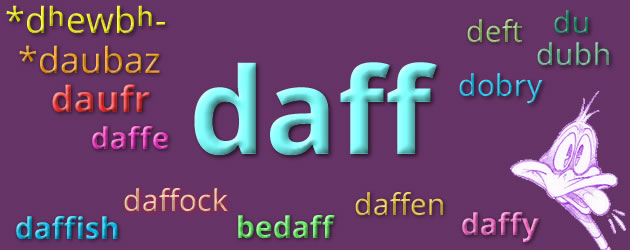Podcast: Play in new window | Download
Today we’re playing with the word daff.

A Daff [dæf] is:
- A fool, idiot or blockhead
It comes from the Middle English daf(fe) (fool, idiot), from the Old Norse daufr (deaf, stupid), from the Proto-Germanic *daubaz [ˈdɑu̯.βɑz] (stunned, deaf), from the PIE *dʰewbʰ- (hazy, unclear, dark, smoke, obscure) [source].
In northern dialects of English and in Scots, daff is a verb that means to be foolish, play, make sport or frolic. It comes from the same root as the noun daff, via the Middle English daffen (to render foolish) [source].
Words from the same PIE root include deaf and dumb in English; and words for black in Celtic languages, such as du [dɨː/diː] in Welsh, and dubh [d̪ˠʊvˠ/d̪ˠʊw/duh] in Irish and Scottish Gaelic [source].
Some words derived from daff include bedaff (to befool, make a fool of, confound), daffen (to make a daff, stun), daffish (stupid, silly), and daffy (somewhat mad or eccentric). Only the last one is much used these days. The others are obsolete or used only in some English dialects, and in Scots [source].
Daff is not related to daft (foolish, silly, stupid), which comes from the Middle English dafte/defte (gentle, humble, modest, awkward, dull), from the Old English dæfte (gentle, meek, mild), from the Proto-West Germanic *daftī (fitting, suitable), from the PIE *dʰh₂ebʰ- (fitting; to fit together) [source].
The English word deft comes from the same PIE root [source], as do words for good in Slavic languages, such as dobrý in Czech and Slovak, and добър [doˈbɤɾ] in Bulgarian [source].
Here’s a video I made of this information:
Video made with Doodly [afflilate link].
I also write about words, etymology and other language-related topics on the Omniglot Blog, and I explore etymological connections between Celtic languages on the Celtiadur.
You can also listen to this podcast on: Apple Podcasts, Amazon Music, Stitcher, TuneIn, Podchaser, PlayerFM or podtail.
If you would like to support this podcast, you can make a donation via PayPal or Patreon, or contribute to Omniglot in other ways.



